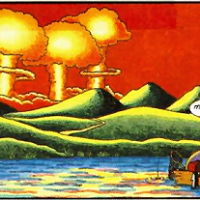Category Archives: Books
 Recently, fellow WordPress blogger Anonymole mentioned in a comment here that he enjoyed Day Zero, a 2021 science fiction novel by C. Robert Cargill. I checked out the Wikipedia article about it, and thought it sounded interesting. Turned out my library had it, so I checked it out (in both senses of the word).
Recently, fellow WordPress blogger Anonymole mentioned in a comment here that he enjoyed Day Zero, a 2021 science fiction novel by C. Robert Cargill. I checked out the Wikipedia article about it, and thought it sounded interesting. Turned out my library had it, so I checked it out (in both senses of the word).
And I agree! It’s very good, and I’d recommend it for any science fiction fan, especially fans of hard SF. It’s the story of a robot uprising that kills most of the humans but as told from the first-person point of view of one of the robots.
It’s the story of his desperate attempt to save the child he was bought to nourish and protect as the world crumbles around them.
Continue reading
4 Comments | tags: artificial intelligence, killer robots, robots, technology | posted in Books, Sci-Fi Saturday
 It has been just over six months since my last Mystery Monday post. It’s not that I haven’t been reading mystery novels (my second-favorite genre) but that I just haven’t been moved to write a post (a bit of a general problem the last year or so).
It has been just over six months since my last Mystery Monday post. It’s not that I haven’t been reading mystery novels (my second-favorite genre) but that I just haven’t been moved to write a post (a bit of a general problem the last year or so).
But I haven’t been idle, quite to the contrary. I’ve now gone through the other three (of the five) character series by Lawrence Block (Keller the Killer, Chip Harrison, and Evan Tanner). Prolific writer, Block.
And I’ve read nearly all of the Sloan and Crosby murder mysteries (also known as the Chronicles of Calleshire) by yet another British writer, Catherine Aird.
Continue reading
7 Comments | tags: Catherine Aird, Lawrence Block | posted in Books, Mystery Monday
 I’ve written many times here about my issues with TV and movie adaptations of existing stories. Short synopsis: I usually find them lacking. Especially the more recent attempts. Extra especially the live-action adaptations of animated stories. So many are just plain awful.
I’ve written many times here about my issues with TV and movie adaptations of existing stories. Short synopsis: I usually find them lacking. Especially the more recent attempts. Extra especially the live-action adaptations of animated stories. So many are just plain awful.
I don’t mean they fill me with awe, at least not the good kind. Sometimes I am a bit in awe that the people involved all thought it was a good thing. Emperor’s New Clothes, perhaps? No one wanted (or dared) to say anything?
Recently, I got to thinking about the worst adaptations I’ve seen…
Continue reading
13 Comments | tags: adaptations, Agatha Christie, Cowboy Bebop, Preacher (TV series), Sandman, storytelling, The Andromeda Strain, Tony Hillerman | posted in Books, Movies, TV
 A late edition Mystery Monday post because I’ve been distracted by various and sundry. I’ve meant this for more than one previous Monday. Not gonna miss another.
A late edition Mystery Monday post because I’ve been distracted by various and sundry. I’ve meant this for more than one previous Monday. Not gonna miss another.
Having pretty thoroughly explored the British Queens of Crime as well as (the American) Ellery Queen, I’ve turned to new pastures: the Butch Karp / Marlene Ciampi stories by Robert K. Tanenbaum and the Matthew Scudder stories by Lawrence Block. And French author Maurice Lablanc!
Plus, I’m disgruntled by Dark Winds, an AMC TV series that (too loosely, IMO) adapts two novels from the Navajo Tribal Police series by Tony Hillerman.
Continue reading
11 Comments | tags: adaptations, Anne Hillerman, Arsène Lupin, Jim Chee, Joe Leaphorn, Lawrence Block, Lupin (TV series), Lupin the Third, Matthew Scudder, Tony Hillerman | posted in Books, Mystery Monday
 This post’s title is a bit vague. Someone familiar with my interests might suppose it has something to do with the Well World series by Jack L. Chalker — I’ve posted about it before. I won’t draw out whatever suspense you might have — the well in question is humanity’s wellspring of stories.
This post’s title is a bit vague. Someone familiar with my interests might suppose it has something to do with the Well World series by Jack L. Chalker — I’ve posted about it before. I won’t draw out whatever suspense you might have — the well in question is humanity’s wellspring of stories.
The revisiting is our love of nostalgia in all the sequels, serials, remakes, reboots, adaptations, borrowings, homages, parodies, and pastiches. To name but some. And make no mistake, all stories have elements of other stories. Boil stories down enough and the reductions begin to look similar (the infamous seven plots).
But I find myself bemused by how obsessed we get about drinking from the same well over and over when there are so many other interesting wells.
Continue reading
22 Comments | tags: adaptations, reboots, remakes, sequels, storytelling | posted in Books, Movies, TV
 If you search for [queens of crime] you’ll turn up four names: Agatha Christie, Dorothy L. Sayers, Ngaio Marsh, and Margery Allingham. They’re all leading lights from the Golden Age of Detective Fiction.
If you search for [queens of crime] you’ll turn up four names: Agatha Christie, Dorothy L. Sayers, Ngaio Marsh, and Margery Allingham. They’re all leading lights from the Golden Age of Detective Fiction.
I’ve known about and read Christie and Sayers since grade and high school, respectively. I’d seen Ngaio Marsh’s name many times over the years but don’t recall ever seeing Allingham’s. Recently I’ve worked through Marsh’s oeuvre. Now I’m exploring Allingham’s.
I’m also working through another queen: Ellery Queen.
Continue reading
6 Comments | tags: Agatha Christie, Albert Campion, Dorothy L. Sayers, Ellery Queen, Margery Allingham, Ngaio Marsh | posted in Books, Mystery Monday
 The previous two posts (this one and this one) each discussed an aspect of Sapiens: A Brief History of Humankind (2011), by Yuval Noah Harari. While those aspects grabbed my attention and got me thinking, I took very little from the rest of the book.
The previous two posts (this one and this one) each discussed an aspect of Sapiens: A Brief History of Humankind (2011), by Yuval Noah Harari. While those aspects grabbed my attention and got me thinking, I took very little from the rest of the book.
In fact, reading the latter two-thirds got to be something of a chore. It had many examples from comparatively modern history (given the full breadth of our existence) but they didn’t seem to amount to a unified whole. The author seems not to connect dots his own text presents.
Final score: two bits I liked and took away (and posted about) but the rest of the book I left behind. I give it a Meh! rating and a thumbs down.
Continue reading
3 Comments | tags: history, homo sapiens, humanity | posted in Books, Society
 The previous post focused on a single, to me key, aspect of Sapiens: A Brief History of Humankind (2011), by Yuval Noah Harari. This post focuses on the other aspect of the book I found compelling. The last one was about the power fiction gave homo sapiens. This one is about the Agricultural Revolution (the AR).
The previous post focused on a single, to me key, aspect of Sapiens: A Brief History of Humankind (2011), by Yuval Noah Harari. This post focuses on the other aspect of the book I found compelling. The last one was about the power fiction gave homo sapiens. This one is about the Agricultural Revolution (the AR).
And other important Revolutions that followed, but the AR wrought a profound change on the human race. It was our first step towards societies and civilization. It ushered in the first cities and led to kingdoms and empires.
It also led to materialism, greed, health issues, theft, and war.
Continue reading
14 Comments | tags: history, homo sapiens, humanity, storytelling | posted in Books, Society
 While not usually my cup of tea, Amazon Prime offered Sapiens: A Brief History of Humankind (2011), by Yuval Noah Harari, and I thought I’d give it a try. I’d never heard of the author, and don’t usually read anthropology or sociology books, but the blurb made it sound interesting (don’t they always).
While not usually my cup of tea, Amazon Prime offered Sapiens: A Brief History of Humankind (2011), by Yuval Noah Harari, and I thought I’d give it a try. I’d never heard of the author, and don’t usually read anthropology or sociology books, but the blurb made it sound interesting (don’t they always).
I did enjoy the first third. The author discusses two aspects of our ancient past that really grabbed my attention. Unfortunately, he went on to lose it. In a big way. For me, the latter two thirds of the book added little and missed what seemed some key connections.
So, three posts (at least): one each for the two attention grabbers; one more for the book overall. This first one is about our special ability as storytellers.
Continue reading
19 Comments | tags: history, homo sapiens, humanity, storytelling | posted in Books, Society
 I’ve been a fan of Japanese anime since the 1980s, but in the last decade or so I’ve come to appreciate it even more (because what’s been coming out of Hollywood lately so often has little redeeming value). As fans of the genre know, anime can be as creative and engaging as any form of storytelling you care to name.
I’ve been a fan of Japanese anime since the 1980s, but in the last decade or so I’ve come to appreciate it even more (because what’s been coming out of Hollywood lately so often has little redeeming value). As fans of the genre know, anime can be as creative and engaging as any form of storytelling you care to name.
Lately, I’ve begun exploring the Japanese media franchise, Lupin the Third (aka Lupin III or Lupin the 3rd). It began back in 1967 and comprises multiple manga, at least six anime TV series, over a dozen films, and other related media.
It taps into our love of master thieves. The fictional monkey-faced Lupin III is acknowledged worldwide as the greatest (and most fun) thief in the world.
Continue reading
16 Comments | tags: anime, Japanese anime, Lupin III, Lupin the Third, thieves | posted in Books, Movies, TV
 Recently, fellow WordPress blogger Anonymole mentioned in a comment here that he enjoyed Day Zero, a 2021 science fiction novel by C. Robert Cargill. I checked out the Wikipedia article about it, and thought it sounded interesting. Turned out my library had it, so I checked it out (in both senses of the word).
Recently, fellow WordPress blogger Anonymole mentioned in a comment here that he enjoyed Day Zero, a 2021 science fiction novel by C. Robert Cargill. I checked out the Wikipedia article about it, and thought it sounded interesting. Turned out my library had it, so I checked it out (in both senses of the word). It has been just over six months since my last
It has been just over six months since my last 
 A late edition
A late edition  This post’s title is a bit vague. Someone familiar with my interests might suppose it has something to do with
This post’s title is a bit vague. Someone familiar with my interests might suppose it has something to do with  If you search for [queens of crime] you’ll turn up four names:
If you search for [queens of crime] you’ll turn up four names:  The previous two posts (
The previous two posts (












